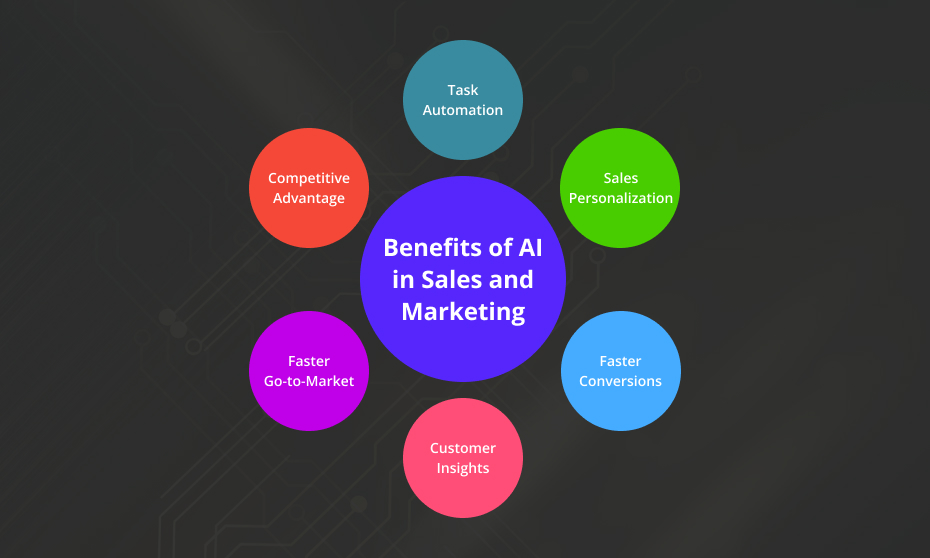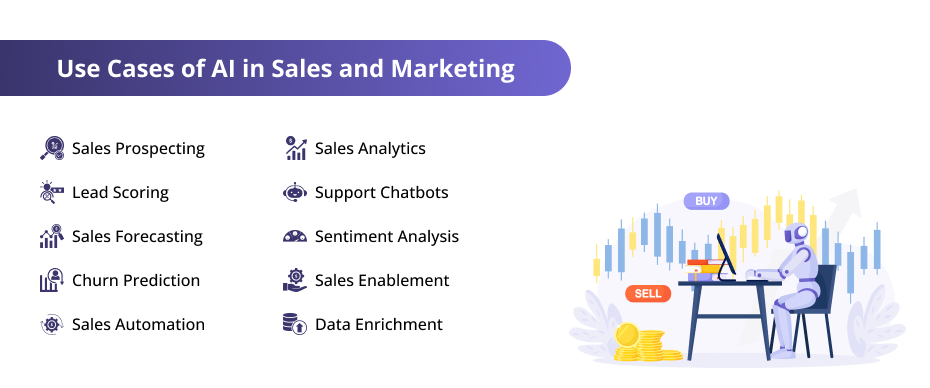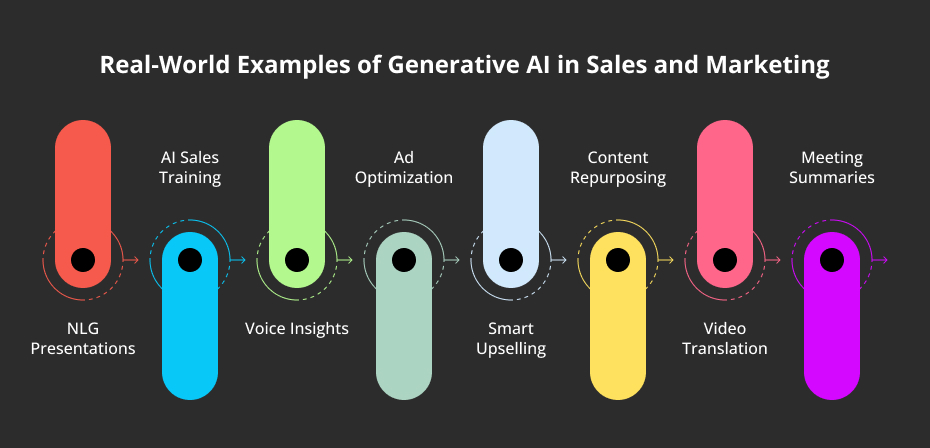Marketing and sales teams have long struggled to stay aligned. They work in silos, leading to wasted effort, lost opportunities, and a lot of finger-pointing. Marketing teams often feel like their leads are being ignored, while sales teams complain that those leads weren’t qualified to begin with.
If this sounds familiar, you’re not alone. Misalignment between sales and marketing is more common than you’d think, and it’s costly. According to ZoomInfo, companies lose 10% or more in annual revenue due to this disconnect.
However, things are starting to change, and a significant part of that shift stems from the adoption of AI in sales and marketing. A report from McKinsey & Company found that organizations using AI are seeing revenue boosts of 13–15%, with a 10–20% jump in sales ROI.
In this guide, we’re pulling back the curtain on how to make the most of AI for sales and marketing. You’ll discover where AI fits in, what it can do for your team, the challenges you might hit along the way, and, more importantly, how to overcome them.
What is AI for Sales and Marketing?
AI in B2B marketing and sales is revolutionizing the industry by automating tedious tasks and freeing up your time. These intelligent tools utilize machine learning and natural language processing to automate tasks such as writing emails, generating content, and analyzing campaign data.
One popular type of AI used for marketing and sales is generative AI, such as ChatGPT, which can write sales copy or marketing materials in seconds. But that’s just the beginning.
Top software development companies are leveraging AI to refine their outreach, track performance in real-time, and engage with customers in more meaningful ways. Simply put, AI sales systems help your team focus more on what really drives results.
Types of AI in Sales and Marketing
Discover key types of artificial intelligence in sales and marketing that enhance automation, insights, personalization, and conversions.
1. Conversational AI
Conversational AI uses AI-powered chatbots and AI sales assistants to enhance sales processes. They free up sales teams to concentrate on higher-value activities.
- Supports multiple languages
- Answers customer questions and guides them through products
- Recommends related products to increase cross-selling
2. Computer Vision
This technology mimics human visual perception. Computer vision can capture, process, and analyze images or videos to identify useful details, such as facial expressions, emotions, and body movements.
- Extracts insights from visual content
- Useful for product tagging and visual search
- Tracks customer behavior through visual data
3. Predictive Analytics
Predictive analytics in sales and marketing utilizes historical data and algorithms to predict future outcomes, enhancing business strategies and decision-making.
- Combines sales and marketing data with industry trends
- Improves the accuracy of sales predictions
- Helps identify sales opportunities early
Benefits of Artificial Intelligence in Sales and Marketing

There are several benefits of AI in marketing and sales. Adopting AI unlocks smarter strategies, improves the customer experience, and strengthens your business to drive real growth.
Benefit | Description | Examples |
| AI for Sales Automation | Handles routine tasks so that teams can focus on strategy and customer experience. | – Auto-update CRM entries – Schedule meetings – Send follow-ups |
| Personalization in Sales | AI for sales teams tailors messages and offers based on buyer behavior. | – Personalized email campaigns – Product recommendations – Smart landing pages |
| Speeds Up the Sales Cycle | Streamlines communication and lead handling, helping close deals faster | – Instant chatbot replies – Lead scoring – Automated quotes |
| Offers Deeper Customer Insights | Uncovers patterns and buyer triggers, enhancing AI sales strategy. | – Sentiment analysis – Journey tracking – Behavior segmentation |
| Accelerates Go-to-Market Strategy | A strong AI tech stack enables faster launches and data-driven campaign planning. | – Real-time ad testing – Ideal customer targeting – Forecasting demand |
| Gives a Competitive Edge | AI for B2B marketing helps businesses react faster and stay ahead. | – Monitor competitor pricing – Adaptive campaigns – Content optimization |
Top 10 Use Cases of AI in Sales and Marketing
Discover how businesses use AI in sales and marketing to enhance efficiency, boost conversions, and deliver a superior customer experience.

1. AI-Powered Sales Prospecting
AI for sales prospecting can scan large datasets to identify high-potential leads more efficiently. They help sales teams prioritize outreach based on buyer intent and fit, significantly improving speed and success rates.
- Identify ready-to-buy leads instantly
- Filter based on behavior signals
- Score prospects by engagement levels
2. Better Lead Generation and Scoring
Best AI tools for sales analyze engagement patterns to identify quality leads more accurately. It scores them based on likelihood to convert, helping teams focus on the leads that matter most.
- Predict lead conversion with intent data
- Score leads by relevance and activity
- Improve targeting with lookalike modeling
3. More Accurate Sales Forecasting
One of the most significant benefits of AI is that it uses real-time and historical data to forecast pipeline outcomes. AI for B2B sales reduces guesswork and supports more informed planning with insights that traditional methods often overlook.
- Predict revenue by deal stage
- Spot trends in buyer behavior
- Adjust forecasts with real-time data
4. Reducing Customer Churn with AI
Today, every company prioritizes customer satisfaction. AI detects early warning signs of churn by analyzing user behavior, support queries, and satisfaction scores. AI marketing tools help brands act quickly and retain more customers.
- Track declining user engagement
- Identify support frustration triggers
- Flag accounts at churn risk
5. Automated Follow-Ups with Buyers
Sometimes, companies forget to follow up regularly. AI ensures timely follow-ups with prospects by sending tailored messages and nudges based on past interactions. AI sales assistant software helps deals move forward without manual effort.
- Trigger reminders based on buyer actions
- Send follow-ups after the demo or call
- Personalize messages with user context
6. Real-Time Sales Analytics & Reports
AI-powered dashboards provide instant insights into pipeline, conversions, and rep performance. AI in sales enablement enables smarter, quicker decisions at every stage of the sales process.
- Monitor real-time campaign performance
- Track rep activities and outcomes
- View conversion metrics instantly
7. Customer Sentiment Analysis
Artificial intelligence in sales and marketing analyzes voice, text, and reviews to detect emotional tone and intent, allowing teams to tailor responses and improve the customer experience.
- Analyze tone in sales calls
- Monitor product feedback on social media
- Identify unhappy customers early
8. AI Chatbots for Instant Customer Support
AI chatbots in marketing and sales offer 24/7 support, resolve basic queries, and guide users through purchasing decisions, saving time and improving service quality.
- Answer FAQs in real time
- Route complex issues to agents
- Guide users to relevant products
9. Cleaner & Smarter Customer Data
AI automatically cleans, enriches, and organizes CRM data, removing duplicates, filling gaps, and enabling businesses to work with accurate customer profiles.
- Fix incomplete customer records
- Merge duplicate contacts
- Add missing firmographic data
10. AI-Based Sales Tools & Training
There are many AI tools that help reps improve through simulated conversations, performance insights, and real-time coaching tools built into your AI tech stack.
- Simulate buyer objections
- Provide coaching post-call
- Suggest talk track improvements
Real-World Examples of Generative AI in Sales and Marketing
Discover how companies are leveraging Generative AI for sales and marketing to personalize outreach, enhance training, and transform conversations into conversions in the real world.

-
NLG for Personalized Sales Pitches
Natural Language Generation (NLG) tools utilize prospect data to craft highly personalized emails, messages, and pitch decks that resonate more effectively and increase response rates.
Example: Outreach.io utilizes generative AI in sales to automatically generate tailored cold emails based on lead activity and job role.
-
Sales Training with Realistic Practice Chats
AI-powered simulators provide reps with realistic practice conversations, enabling them to improve their objection handling, tone, and pitch delivery before going live.
Example: Second Nature AI allows reps to role-play with AI avatars, providing live feedback and scoring.
-
Voice Analysis to Improve Sales Calls
Generative AI in sales and marketing listens to sales calls and analyzes tone, pauses, and emotion to identify what works and what needs fixing.
Example: Gong.io utilizes AI to analyze both successful and unsuccessful conversations for coaching sales representatives.
-
Target the Right Audience with Smart Ads
Generative AI for business enables the creation of hyper-targeted ad creatives and segments based on behavior, geography, and past interactions, thereby enhancing campaign ROI.
Example: Meta Advantage+ leverages generative models to auto-optimize ad targeting and messaging at scale.
-
Contextual Upselling and Cross-Selling
Generative AI use cases in sales are vast. Gen AI analyzes real-time user behavior and suggests products that align with intent, increasing basket size and lifetime value.
Example: Amazon uses generative AI to show “Frequently bought together” and “You might also like” prompts during checkout.
-
Auto-Create & Adapt Sales Content
Generative AI sales tools enable the quick drafting, localization, or repurposing of sales materials, keeping content fresh and consistent across all channels.
Example: Copy.ai helps B2B teams spin up tailored value propositions for each buyer persona instantly.
-
Translate Marketing Videos Instantly
Generative AI development now translates audio, lip-syncs video, and even adjusts tone for different languages and regions, eliminating the need for manual editing.
Example: Synthesia enables marketing teams to generate multilingual video explainers from one original script.
-
Summarize Customer Calls and Meetings
Gen artificial intelligence in sales meeting assistants now listens to calls, extracts key takeaways, and automatically syncs notes to CRMs, eliminating the need for manual work.
Example: Fireflies.ai records sales meetings, summarizes discussions, and tags follow-up actions directly into HubSpot or Salesforce.
Key Challenges of AI in Marketing and Sales
While AI in marketing and sales offers significant advantages, it also presents real-world challenges that teams must understand and address to succeed.
Challenge | Description | Solution |
| Data Quality and Consistency | AI models rely on clean, structured data. Inconsistent CRM or customer data can lead to poor decisions. | Set up regular data audits, utilize AI-based data cleaning tools, and train teams on data hygiene practices. |
| Lack of Skilled Talent | Teams often struggle to hire or upskill talent who can effectively work with AI systems. | Offer in-house training, hire AI Developers, and focus on user-friendly AI platforms |
| Overdependence on Automation | Relying too much on AI can depersonalize customer interactions or create robotic experiences. | Blend AI with a human touch, especially in key decision-making or relationship stages. |
| Complex Integration with Legacy Systems | AI tools often don’t plug easily into outdated marketing and sales platforms. | Use middleware tools or APIs to connect systems and plan phased integration. |
| Privacy and Compliance Risks | Mismanaging personal data or breaching regulations can damage trust and lead to legal issues. | Ensure AI tools comply with GDPR/CCPA rules and obtain clear opt-ins for data usage. |
How To Implement AI for Sales and Marketing Successfully
To unlock the full potential of AI in sales and marketing, businesses need a smart and structured plan from the outset.
1. Define Clear Sales and Marketing Goals
Before bringing in any tools, ensure you are crystal clear about what you want to achieve.
- Identify specific outcomes like lead conversion or customer retention
- Align goals between your marketing and sales teams
- Set measurable KPIs to track progress and ROI
2. Audit Your Existing AI Tech Stack
Evaluate what tools and systems you already have before investing in new ones.
- Check current CRM, analytics, and marketing automation platforms
- Identify gaps where AI marketing tools can drive the most value
- Make sure your stack can support scalable AI integration services
3. Partner with the Trusted AI Development Services
The project-preferred partner can accelerate deployment and reduce costly mistakes.
- Ensure they offer custom AI models and integration support
- Look for AI development services with proven domain experience in your industry
- Ask for case studies or client success stories
4. Start Small and Run Pilot Projects
Test AI tools in focused areas before scaling across the organization.
- Use pilot programs to validate tools with real sales data
- Focus on one use case, like lead scoring or content automation
- Gather internal feedback and performance data early
5. Choose Scalable Tools
Invest in platforms that grow with your needs and won’t lock you in.
- Prioritize solutions with strong support and frequent updates
- Look for platforms with an easy API and third-party integration
- Choose AI development companies known for long-term innovation and service
6. Train Your Teams and Optimize Continuously
AI-driven marketing strategies are only as effective as the people implementing them, so team buy-in is crucial.
- Offer hands-on training tailored to each role
- Encourage collaboration between sales, marketing, and IT
- Monitor results and keep improving your approach based on data
The Future of GenAI for Sales and Marketing
Generative AI is advancing rapidly, and its impact on sales and marketing is just beginning to take hold. Here’s what’s coming next.
1. Hyper-Personalization at Scale Will Become Standard
Generative AI development is making it possible to create tailor-made content, emails, and offers for thousands of prospects instantly.
- Dynamic pitch decks customized per industry or role
- Personalized video messages generated with AI avatars
- Targeted ad creatives based on real-time user behavior
2. Sales Teams Will Co-Sell with AI Assistants
Instead of just using AI for insights, reps will soon collaborate with GenAI like a teammate during live interactions.
- Live script suggestions during customer calls
- Real-time objection handling powered by large language models
- Smart notetakers that summarize and draft follow-ups instantly
3. Marketing Will Shift to Always-On Content Engines
Marketing teams will rely on GenAI to auto-generate and adapt campaigns without having to start from scratch every time.
- Multi-format content from one AI-driven prompt
- AI tools testing multiple ad variations simultaneously
- Localization and translation done in minutes, not weeks
Transform Your Sales & Marketing with AI Development Services from SparxIT
AI in sales and marketing is no longer a “nice to have,” it’s a competitive edge. From automating follow-ups to generating hyper-personalized content, AI in digital transformation lets your teams do more with less effort and greater precision. However, successful adoption requires more than just tools. You need the right strategy, integration, and ongoing support to succeed. That’s where SparxIT comes in.
We bring deep expertise in Generative AI development services tailored to your workflow, goals, and technology stack. Ready to unlock smarter, faster, and more profitable growth?

Partner with Experts
Frequently Asked Questions
What are the key benefits of using Generative AI in sales?







Generative AI enhances sales productivity by automating content creation, personalizing communication, summarizing calls, and enabling reps to respond more quickly, resulting in shorter sales cycles and increased conversions.
What are some common use cases of Generative AI for sales teams?












Sales teams use Generative AI for writing email pitches, creating sales decks, simulating training conversations, summarizing customer meetings, and generating real-time suggestions during live calls.
What tools use Generative AI for sales automation and marketing?












Popular tools include ChatGPT, Salesforce Einstein GPT, HubSpot AI, Lavender, and Outreach, all of which help automate outreach, personalize content, and improve sales enablement with real-time suggestions.
Are there any risks or challenges in using Generative AI for sales and marketing?












Yes, risks include inaccurate content, brand inconsistency, biased data outputs, and concerns about data privacy. Without proper oversight, GenAI may misalign with tone or customer expectations.
What’s the difference between traditional AI and generative AI in sales?












Traditional AI analyzes data to predict outcomes, while Generative AI creates new content like emails or scripts, helping sales teams personalize outreach and engage leads more effectively.



